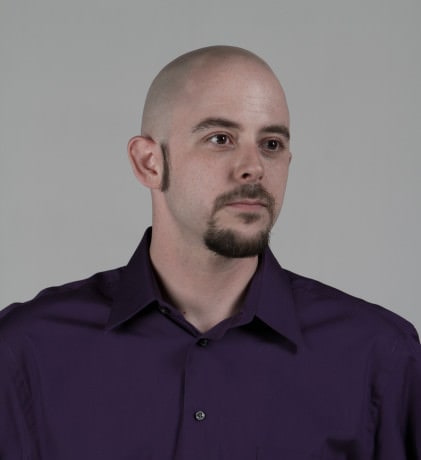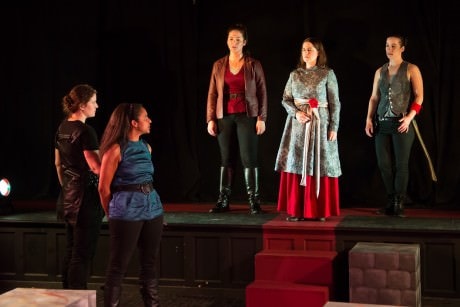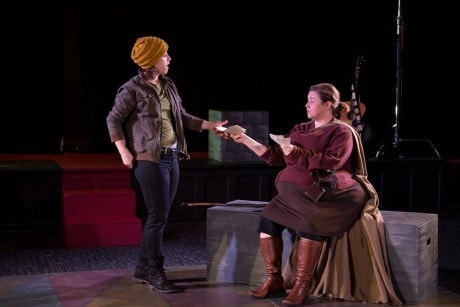Back in December 2014 I had a conversation with the Director Kevin Finkelstein that has stayed with me. I had just seen his staging of A Klingon Christmas Carol, a one-night-only seasonal novelty presented by WSC Avant Bard at Theater J. When I met him at the buzzy post-show reception, I told him I noticed there had been a lot of strong women characters in the performance, played by some really strong women actors. Kevin told me that was very intentional—and it reflected a longtime personal and artistic commitment of his.
Ever since I have been wanting to continue that conversation.
Kevin recently directed Henri IV, a “re-gendered” version of Shakespeare’s Henry IV, parts one and two, retitled Henri IV for Brave Spirits. In it, women play the men and men play the women. Out of a total of 67 characters in both plays, 61 have been cast cross-gender.
The time was ripe for us to talk.
John: First of all, hello again!

Kevin: Hi, John! Thanks so much for taking the time to speak with me! I do want to clarify something in your introduction: cross-gender casting is when women are cast to play roles written for men. Re-gendering (what Henri IV does) is literally changing the gender of the character as it was written. With cross-gender casting, pronouns aren’t typically changed. In our world, we’ve spent an extraordinary amount of time working with the text to accurately reflect the matriarchal world we’re examining.
Thanks for clarifying that! I bet I’m not the only one who did not know that.
It’s wonderful that you mention A Klingon Christmas Carol. Whenever you change something that the audience is expecting to see, you run the risk of alienating them (consider the Michael Bay Transformers movies, for example). We took a small risk, casting some of those characters as their gender opposites, but the result was a production so infused with life and variety that I can’t imagine doing it any other way. Klingons are a warrior race: proud, quick tempered, aggressive, and honorable. Nothing about that description limits us in terms of gender, so why should the casting be limited?
I’m really curious about what you’ve done with Henri IV. I have been following the Women’s Voices Theater Festival closely, seeing as many things as I can (31 now and counting). And ever since I saw Caryl Churchill’s breakthrough play Cloud Nine in New York (the legendary Tommy Tune production), I have been fascinated by—perhaps obsessed by—theater’s potential as an art form for revelatory inquiry into the intersecting meanings of sex, race, and class.
Okay, that was a mouthful. Now let me get right down to it and ask you: What exactly are you up to in Henri IV? What exactly have you done?
James McDonald just closed a riveting remount of Cloud Nine at the Atlantic, and while I didn’t see the original Tommy Tune production (I was four), I suspect McDonald’s production was just as challenging and thought-provoking as Tune’s. What I loved about McDonald’s staging was setting the piece in the round (that is to say, seating audience on all four sides of the stage). This type of setup forces the production to be honest, because when audience members are five feet away from the action, they can tell if something isn’t being played truthfully.
When we think of Shakespeare’s Henry IV, we think of a patriarchy beset by war and power struggles. As our dramaturg, Mara Lawrence, is so fond of telling us, “These plays are basically a family squabble with swords.” Rather than examining this squabble through traditional casting, we wondered what would happen if this world existed as a matriarchy. Of course, a matriarchy that appears in the middle of a historic run of patriarchies isn’t going to look terribly different. So we’ve shifted the world of this play into an “alternate reality,” where women have historically been the dominant gender.
It’s also worth noting that Brave Spirits Theatre has been the perfect incubator for this project. The company’s commitment to “verse and violence,” as well as creating more opportunities for female artists in classical theatre, dovetails nicely with this concept. One of the things we often talk about is how women make up 51 percent of the population, but comprise only 16 percent of Shakespeare’s characters. Brave Spirits also strives to stage productions that focus on the traditionally silenced female narrative and question the patriarchal constructs present in these works, so this seemed like a natural fit.

What has been your process during rehearsals? And how have the actors responded to the approach?
I approach projects like this with two purposes: I want the audience to consider the “new” relationships we’re creating on this stage, and I want them to walk out thinking about their own preconceptions. I’m a huge fan of Brechtian theatre, but I think it is possible to emotionally affect an audience and still expect “rational self-reflection.”
We spent our first week just talking about what this society would be like. And when I say “we,” I mean that everyone involved in this production was a part of this “world building” conversation, from actors to designers to the production team. The result is a collective that is strongly invested in the world we’ve built, simply because we built it.
Sure, I can walk into a rehearsal and say, “Things will be like this and that.” I know plenty of quality directors who take this approach. For me, a project is only as strong as the sum of its parts. By working collaboratively, by giving a voice to every person around the table, everyone involved has ownership of the concept as a whole.
What are some examples of particular moments in performance that have become especially interesting or illuminating because the gender roles were reversed?
The first example that jumps out at me is Hotspur. Rather than the hot-headed, spasticness we normally come to expect from Hotspur, Briana Manente brings more nuance. The relationship with her mother, her wife, her friends…all of it is different, and all of it is illuminating.
But re-gendering is a two-way street. James Majewski, who plays Master Quickly, has brought this character to light in a way that really hasn’t been done before. It’s delightful, genuine, and a little sobering: seeing how the women of the play treat him might give audiences an opportunity to examine their own relationships with gender.

Why was this approach important to you—both personally and as a theater artist? And why should it matter in the context of the Metro DC theater landscape?
I’m a fortunate soul. I have a day job that gives me the freedom to explore these types of relationships on stage. I also feel, as a white male, a sense of responsibility toward the DC community at large. As theatre artists, we should be advocating for these kinds of conversations. I think Aristotle had it right when he talks about human beings as mimetic beings, giving in to the urge to create art that represents and reflects reality (life). A two-part show featuring 63 male roles (as Shakespeare wrote them) isn’t reflective or representative of the current climate, so why would we want to show that to our audiences?
There’s a portion of the Artistic Director’s note (in the show’s playbill) that has stuck with me since I read it. “We must allow women to exist in art in all the many ways they exist in real life. It is no longer enough to make the argument that women can play these characters; we must also fight for the fact that these characters can be women.” I couldn’t agree with this sentiment more.
What are some of your past experiences as a director foregrounding women characters and actors on stage? What have you learned? And what advice would you give to a young male director starting out?
As a theatre artist with many hats (I write, produce, and direct), I have different approaches. Every show that I write has (at least one) strong female lead. Most of those shows have more female roles than male. When I direct, I look for places to create more opportunities for women while still telling the story. For example, I’ve directed Julius Caesar (or some variation of it) five times, and each time I’ve cast Cassius as a woman. Even if that’s the only change, it drastically changes the show. All of a sudden, it’s not eight men entering into a conspiracy led by two others; it’s eight characters entering into a conspiracy helmed by a man and a woman. The difference can be subtle, but it is important.
Another example of this is a web series I’m developing with Steve Bradford called Tempora Heroica. As with any original material, I have quite a bit of flexibility in terms of the characters I create and the world I design. I can create rich, varied female characters just as easily as male characters, and giving the audience the opportunity to see a badass female superhero is just as important as them seeing a flawed female superhero.
Every script that I’ve written passes the Bechdel Test. If it didn’t, I wouldn’t want to see it performed.
What do you hope audiences will take away from seeing the Brave Spirits production of Henri IV?
Most important, I want audiences to consider their own thoughts on gender. “Conventional wisdom” tells us that men are more warlike and women are more nurturing. Men are more prone to action, women are more prone to thought. Men act without considering the repercussions, women think things through.
Of course, with any bit of “conventional wisdom,” it’s easy to fall into a binary trap. What we’re hoping audiences will understand is that assigning these descriptions is, at best, disingenuous. Women are just as capable of being hot-headed, and men are just as capable of being thoughtful. It’s time we stop trying to apply characteristics to gender as a whole and instead look at the individual.
Running Time: Two hours and 30 minutes, with one intermission.
Henri IV Parts 1 and 2 plays through November 22, 2015 at The Lab at Convergence – 1819 North Quaker Lane, in Alexandria, VA. Purchase tickets online.
LINK
Katie Bogdan’s reviews of Henry IV Part 1 and Henry IV Part 2 on DCMetroTheaterArts.





